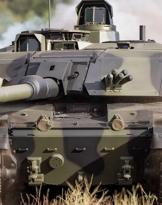"The Germans in Russia lost due to logistics." This very simple concept was explained to me by an uncle - an Alpine veteran from Armir - who added: "Do you know why the Russians fear the Americans? Because of their logistics. They are not afraid of anyone else, they can beat any army that challenges them on their field, in the long run. But they fear the US logistical capacity, its ability to use time as a 'weapon".
He didn't say anything else. He always refused to talk to me about what he saw and went through in those terrifying two years of his life.
Afterwards, finding myself thinking like a soldier, evaluating tactics and strategies of past conflicts, reading and listening to the accounts of historians and the analyzes of the most esteemed military scholars in the world, I could do nothing else, page after page, symposium after symposium, but find myself I agree with the simple words of my Alpine uncle.
"Logistics" therefore...
There is a very well-known film ("The Battle of the Giants"), in which an extraordinary German tank officer, veteran of theoperation Barbarossa, in December 1944 in the Ardennes shows a package seized from a captured American soldier: a chocolate cake from Boston, which the US infantryman's mother sent for Christmas.
The tank driver, at that precise moment, understands that the war is lost: you can't beat a nation that uses a military plane, which flies unharmed over the Atlantic Ocean, to send sweets to the front.
Not even a ship, which would already have been significant, but a plane! The German veteran knew it: this was, and is, the unparalleled power of logistics.
Even Napoleon was aware of it. It was he who said: "an army marches on its stomach". As I am sure that every general knows this essential military principle: Efficient supplies are only as good as the most effective tactics.
Like Hitler 130 years later, Napoleon was overcome by the need to save himself, as if those immense territories were a kind of refuge, the last hope of personal redemption for the mistakes committed elsewhere, believing with this that he could appease the wrath of the God of war that they themselves had summoned. And the logistics, who is that god's favorite daughter, it can tear apart: bullet after bullet, ration after ration, liter of fuel after liter of fuel, missile after missile, drone after drone, day after day, kilometer after kilometre...
Nothing has changed!
European politicians, Italians in particular, but also American teachers, seem to be realizing that they have not fully learned the lesson. And the bill to pay for this unfortunate ignorance risks being unsustainable for an entire continent. And for decades.
Today, much more than yesterday, an infantry soldier consumes food, ammunition and equipment worth thousands of euros per day. The largest cost, by far, is represented by the transport of these materials from the warehouses to the area of operations on the front.
The availability of money is not the only limit: it is the very structure of the logistical and productive apparatus that represents the real fighting capabilities of a nation.
Has the time come for us to deal with reality?
As a nation, we do not have the resources to manage military "power projection" engagements beyond regimental or half-brigade level operations, for long periods.
Paradoxically, it costs us less to send fighters to some forward base, or a couple of frigates on patrol off the coast of war zones, in organizational terms.
But, even admitting that we know how to organize ourselves, if as always in the end it will only be a question of money (see the pro-Ukraine budget being re-discussed at the US congress), then we should not forget, pragmatically, that our "national current account" starts from a balance in the red of 3000 billion euros, about.
As taxpayers and also, if not above all, as fathers and mothers of children of age for military service, perhaps this is what we should focus our most "realistic considerations" on today.
Image: still from the film "The Battle of the Giants" (1965)












